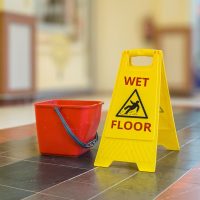Suing a Business in a Slip and Fall

If you slipped on a wet floor in a restaurant, grocery store, or other business, you may have a claim for damages against the business. In order to collect compensation, you’ll need to satisfy certain legal obligations and prove that the business is indeed to blame for your injuries. Below, we discuss the key elements of a slip-and-fall claim against a business. Call a seasoned Southern California premises liability lawyer for advice and assistance if you’ve been hurt in a slip and fall in Los Angeles or Orange County.
Time Limit for Claims
It’s important to talk to a personal injury attorney as soon as possible after a slip and fall injury to preserve your legal rights. Every legal claim has a time limit, known as a “statute of limitations.” In California, the statute of limitations for a slip and fall personal injury claim is two years from the date of injury. Unless some unusual exception applies, if you wait more than two years to file your lawsuit, your case could be dismissed as untimely. You’ll forego your right to recover.
Proving Liability Against a Business
To recover from a business after a slip and fall injury, you’ll need to prove that the business should be held liable. Liability requires proving duty, breach, causation, and injury. In a slip and fall case, duty and breach usually require proving negligence. Business owners owe a duty of care to customers and other visitors; if a store employee did something negligent or failed to take appropriate action, then they have breached that duty. If that negligent behavior caused a hazard that led to your slip and fall and you suffered physical or financial harm as a result, then you can recover compensation.
Most slip-and-fall cases turn on the question of negligence. Did the store (i.e., a store employee) do something that a reasonable person would not have done, or fail to do something that a reasonable person would have, under the circumstances? If an employee of the business creates a hazard–if they, for example, spill some liquid or mop the floor–the store has a duty to either remedy the hazard or place adequate warning. If they do neither–if they do not dry the floor or conspicuously place a “wet floor” sign, for example–, and you are hurt as a result of that hazard, then you can hold the business liable.
Businesses are also responsible for taking ordinary care in addressing hazards they should know about even if they didn’t create them. If a customer causes a spill, or if rain or snow from outside causes a wet floor, the business should clean up the hazard or put out a warning sign. If the business did not create the hazard, however, the plaintiff will need to show that the business either knew or should have known about the hazard. A wet floor from customers tracking in rain or snow is obvious–store owners should put up a sign immediately or work to dry the floor.
If a customer caused a spill and no employee was around to see it, liability might turn on how long the hazard was present. If the spill happened mere moments earlier, it might not be reasonable to expect the store to identify and remedy the spill. If the spill happened an hour ago or several minutes ago, it’s reasonable to expect an employee to have discovered the spill during normal inspections and maintenance. Similar logic applies if a fall was caused by a loose carpet or floor mat, discarded equipment, uneven flooring, or other hazards: Did the store know, or should they have known, about the hazard?
An experienced slip-and-fall attorney can investigate the circumstances of an accident to determine who should be held liable and how best to hold them liable.
Call Today for Professional Advice and Effective Representation After a Slip and Fall in Los Angeles or Orange County
If you or a loved one was seriously hurt in a slip and fall accident in Los Angeles or Orange County, call Machtinger Law for advice and representation from a skilled and dedicated Southern California premises liability attorney.
